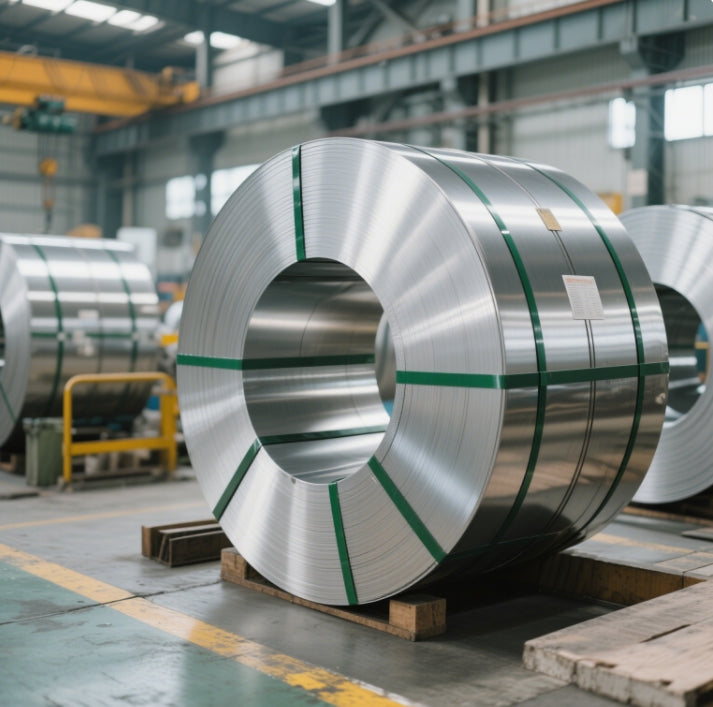StockSteel
Top-Tier 316L Stainless Steel Coil | Mirror Finish & Polished Edge
Top-Tier 316L Stainless Steel Coil | Mirror Finish & Polished Edge
Couldn't load pickup availability
Top-Tier 316L Stainless Steel Coil | Mirror Finish & Polished Edge
Product Overview
| Property | 316L Stainless Steel Coil |
|---|---|
| Material Grade | ASTM A240, SUS316L, EN 1.4404, UNS S31603 |
| Thickness | 0.1–20 mm (Cold Rolled), 3–100 mm (Hot Rolled) |
| Width | 10–2438 mm (Customizable) |
| Surface Finish | Mirror (8K), Hairline, 2B, BA, No.4, Matte |
| Hardness | ≤187 HB (Annealed), ≤210 HV (Cold Worked) |
| Tensile Strength | ≥480 MPa |
| Yield Strength | ≥175–210 MPa |
| Elongation | ≥40% |
| Density | 7.98 g/cm³ |
| Melting Point | 1371–1450°C |
| Processing | Cold/Hot Rolled, Laser Cutting, Welding, Slitting, Deep Drawing |
| Certifications | ISO 9001, SGS, RoHS, ASTM A240, EN 10088 |
Key Technical Specifications
Tensile & Bend Strength
The 316L stainless steel coil delivers exceptional tensile strength (≥480 MPa) and yield strength (≥175–210 MPa), making it ideal for high-stress industrial environments such as chemical processing and stainless steel coiled tube systems. Its austenitic structure, enhanced with 2–3% molybdenum, provides superior resistance to chloride-induced pitting and crevice corrosion, outperforming standard 304 grades. The elongation rate of ≥40% ensures excellent ductility for complex forming processes like deep drawing and bending without cracking, crucial for 2 inch stainless steel coil tubing fabrication.
Weight Calculation
Calculate coil weight using:
Example: A 316L coil (2mm thick, 1.5m wide, 50m long) weighs:
This formula is critical for logistics planning and cost estimation, particularly for large-scale applications of stainless steel coils such as heat exchangers and marine pipelines.
Identification Methods
- Chemical Analysis: Confirm Cr (16–18%), Mo (2–3%), and Ni (10–14%) via XRF testing.
- Magnetic Testing: Non-magnetic in annealed states but slightly magnetic after cold working.
- Spark Testing: Produces reddish sparks with minimal branching, contrasting with high-carbon steels.
Causes of Stainless Steel Corrosion
- Chloride-Induced Pitting: Coastal environments or de-icing salts penetrate the passive Cr₂O₃ layer, forming micro-pits. 316L’s molybdenum content reduces this risk by 30–50% compared to 304.
- Galvanic Corrosion: Contact with carbon steel or copper in humid conditions accelerates oxidation. Use insulating spacers in stainless steel coiled tube installations.
- Mechanical Abrasion: Scratches from handling tools expose raw metal to oxygen. Mirror finishes (Ra ≤0.2μm) reduce this risk.
- High-Temperature Oxidation: Prolonged exposure above 870°C degrades chromium’s oxide film. 316L outperforms 304 in thermal stability up to 925°C intermittently.
- Organic Acid Accumulation: Food residues or industrial chemicals form corrosive films, particularly on unpolished surfaces.
Applications & Advantages
Versatile Industrial Use
- Chemical & Petrochemical: Resists sulfuric acid and chloride-rich environments in 2 inch stainless steel coil tubing for reactors and pipelines.
- Marine Engineering: Ideal for ship components and offshore platforms due to saltwater corrosion resistance.
- Medical & Food Processing: Hygienic 2B/BA finishes (Ra ≤0.2μm) prevent bacterial growth in surgical tools and dairy tanks.
- Energy Systems: Used in applications of stainless steel coils for heat exchangers and boiler plates.
Functional Benefits
- Self-Healing Oxide Layer: Chromium (≥16%) forms a regenerative Cr₂O₃ film to repair minor scratches.
- Thermal Stability: Withstands temperatures up to 870°C (continuous) and 925°C (intermittent).
- Cost Efficiency: Longer lifespan reduces replacement frequency, offering 20–30% lower lifecycle costs than carbon steel.
Why Choose Our 316L Stainless Steel Coils?
- Certified Quality: Sourced from TISCO/BAOSTEEL mills with ISO 9001, SGS, and RoHS compliance.
- Custom Fabrication: Tailored slitting (3–2438mm), mirror polishing, and precision edging for 2 inch stainless steel coil tubing projects.
- Global Logistics: 7–15-day delivery via FOB/CIF with VCI anti-rust packaging.
- Cost Efficiency: Direct mill partnerships reduce prices by 15–20% vs. competitors.
- Technical Expertise: 20+ years in alloy selection, welding, and corrosion prevention consulting.

